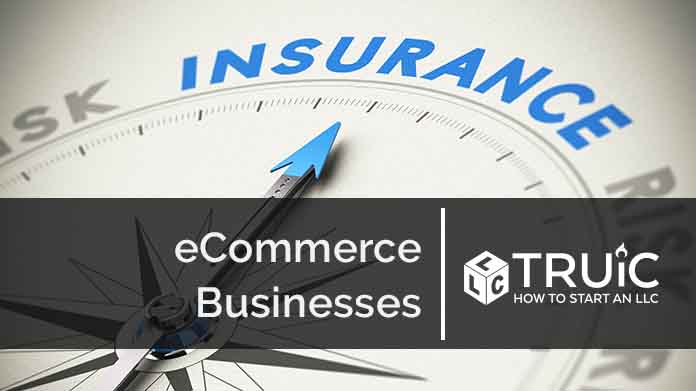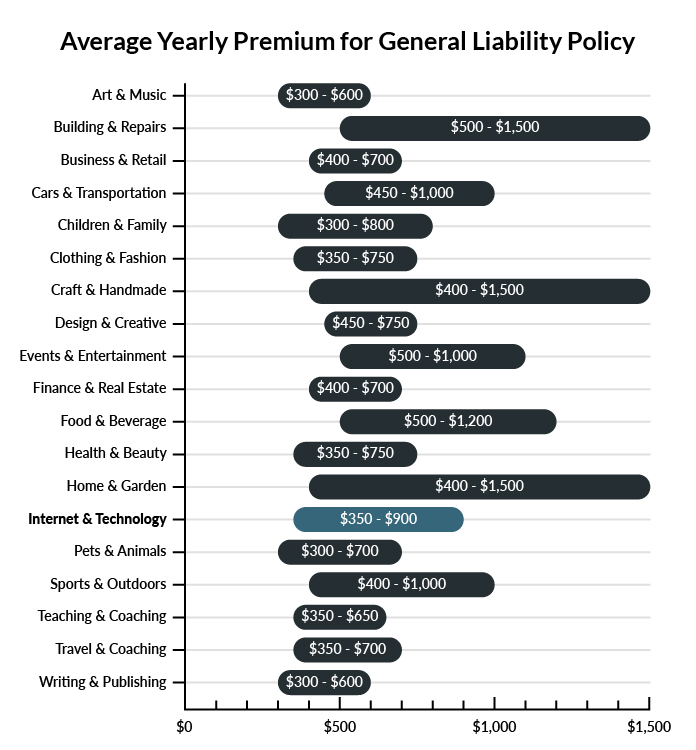Ecommerce Business Insurance
Getting insurance for your ecommerce business is essential.
Ecommerce businesses need to be protected against claims arising from things like contractual breaches, false advertising, and data breaches.
For example, your business suffers a hack and the personal information of some customers is released, or a freelance developer claims that you did not uphold your end of your contract.
We’ll help you find the most personalized and affordable coverage for your unique business.

Recommended: Next Insurance is dedicated to matching small businesses with the right policy at the best price.
Best Insurance for an Ecommerce Business
General liability insurance is — generally speaking — one of the most important insurance policies for ecommerce businesses.
Some of the risks general liability insurance covers are:
- Bodily injury
- Property damage
- Medical payments
- Legal defense and judgment
- Personal and advertising injury
As general liability is often insufficient by itself in protecting ecommerce businesses from all the risks they are likely to face, it is common for several extra policies to be carried, such as:
- Product liability insurance
- Data breach insurance
- Commercial property insurance
- Business interruption insurance
- Workers’ compensation insurance
It is essential to be aware of the different types of insurers when buying coverage for your ecommerce business. Typically, insurance providers can be one of two types:
- Traditional brick-and-mortar insurers — Describes firms with physical storefronts and/or offices (e.g., Hiscox and Nationwide). Such insurers were historically popular but are starting to be less sought after following the growth of online providers, who make their prices seem expensive by comparison.
- Online insurers — Describes firms without physical stores/offices (e.g., Tivly and Next). By operating purely online, such firms are able to offer far more affordable quotes due to their lower operating costs.
Let's Find the Coverage You Need
The best insurers design exactly the coverage you need at the most affordable price.
Cost of General Liability Insurance
On average, ecommerce businesses in America spend between $350 - $900 per year for $1 million in general liability coverage.
Compare the average cost of general liability insurance for an ecommerce store to other professional industries using the graph below.
Several factors will determine the price of your policy. These include your:
- Location
- Deductible
- Number of employees
- Per-occurrence limit
- General aggregate limit
You may be able to acquire general liability insurance at a discounted rate by purchasing it as part of a business owner’s policy (BOP) rather than as a standalone policy.
A BOP is a more comprehensive solution that includes multiple forms of coverage, such as business interruption and property insurance.

Find the Best Rate
Discover the best coverage at the lowest rate in our cheapest business insurance review.
Provided by
Common Situations That General Liability Insurance May Cover for an Ecommerce Business
Example 1: To gain further exposure for your business, you sign up to sell merchandise at a local convention. The convention requires all vendors to carry $1 million of liability insurance, and a general liability policy would fulfill that requirement.
Example 2: Your new website features a copyrighted photo, and the photo’s owner sues you for copyright infringement. General liability insurance would cover your legal fees and any payment awarded to the claimant (up to the limits of the policy).
Example 3: You plan to expand your business by offering additional items, but need a bank loan to move forward. Your bank requires evidence of liability insurance as part of its loan terms, and a general liability policy would fulfill that requirement.
Other Types of Coverage Ecommerce Businesses Need
While general liability is the most important type of insurance to have, there are several other forms of coverage you should be aware of. Below are some of the most common types of coverage:
Product Liability Insurance
While your ecommerce business doesn’t accept visitors to a physical office, you still face a number of liability risks. If someone claims a product you sell caused them injury or illness, product liability insurance would cover your legal fees and any awarded damages in the event of a lawsuit.
You can purchase product liability coverage — tailored to your business’ specific needs — as part of a business owners policy (BOP).
Data Breach Insurance
Studies indicate retailers face the greatest risk of a cyber attack — particularly those running ecommerce sites. Data breach insurance covers damages resulting from stolen customer information, and most general liability policies specifically exclude this type of coverage.
Commercial Property Insurance
As an ecommerce business, your company property is vital to your revenue stream. Commercial property insurance covers the cost of repairing or replacing any business-related property in the event of a fire, burglary, or natural disaster. This includes the items you sell and any business-owned buildings. Because an ecommerce company differs from brick-and-mortar retailers, owners should discuss the intricacies of their business with an insurance professional to ensure no coverage gaps.
You can purchase commercial property insurance as part of a business owners policy (BOP).
Business Interruption Insurance
If your company suffers a significant accident and loses inventory, you could be out of business for days, weeks, or months. Business interruption insurance can help cover some of your lost revenue while you make repairs and restock, ensuring your company doesn’t fail before you’re back up and running.
You can purchase business interruption insurance as part of a business owners policy (BOP).
Workers’ Compensation Insurance
Most states require businesses to carry workers’ compensation insurance for their part-time and full-time employees. This coverage protects your employees if they become injured at work or fall ill after a work-related accident. It not only covers an employee’s medical bills and lost wages if they need time to recover but also any disability or death benefits stemming from a work-related accident. These policies also cover your legal fees if an injured employee names your business in a lawsuit.
While many states allow business owners to exclude themselves on their workers’ compensation policy, consider skipping this option if you plan to participate in your business’ daily operations.
You can purchase this coverage as a standalone policy.
Additional Steps To Protect Your Business
Although it’s easy (and essential) to invest in business insurance, it shouldn’t be your only defense.
Here are several things you can do to better protect your ecommerce store:
- Use legally robust contracts and other business documents. (We offer free templates for some of the most common legal forms.)
- Set up an LLC or corporation to protect your personal assets. (Visit our step-by-step guides to learn how to form an LLC or corporation in your state.)
- Stay up to date with business licensing.
- Maintain your corporate veil.
Ecommerce Store Insurance FAQ
Yes, absolutely. You will need to first get a quote from an online business insurance provider like Next Insurance. Next allows you to then purchase a policy immediately and your coverage will be active within 48 hours.
A typical business owner’s policy includes general liability, business interruption, and commercial property insurance. However, BOPs are often customizable, so your agent may recommend adding professional liability, commercial auto, or other types of coverage to your package depending on your company’s needs.
"Business insurance" is a generic term used to describe many different types of coverage a business may need. General liability insurance, on the other hand, is a specific type of coverage that business owners need to protect their assets.
Certainly. If not because it protects your ecommerce business from the financial loss of unforeseeable events, obtaining business insurance must be done before your business launches in case it is legally obligated to carry specific policies (e.g., commercial auto or workers’ compensation).
Failing to obtain adequate insurance can lead to legal problems further down the line.
Not necessarily. Certain exceptions may be written directly into your ecommerce store insurance policy, and some perils may be entirely uninsurable.
Yes, an LLC is meant to create a legal barrier between your business and your personal assets and credit. If you haven’t formed an LLC yet, use our Form an LLC guide to get started.
An LLC doesn’t protect your business assets from lawsuits and liability– that’s where business insurance comes in. Business insurance helps protect your business from liability and risk.